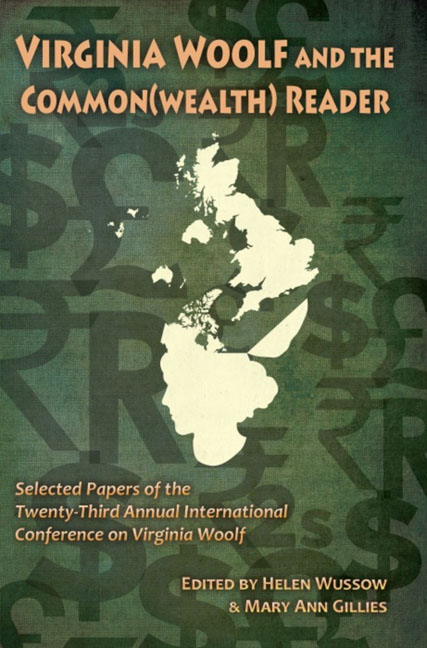Book contents
- Frontmatter
- Contents
- Introduction to Virginia Woolf and the Common(wealth) Reader
- Acknowledgments
- List of Abbreviations
- Invocations
- Networks of Affiliation: Foundations and Friends
- Education and Empire in Victorian Bloomsbury
- Synthesizing Civilizations: Leonard Woolf, the League of Nations, and the Inverse of Imperialism, 1928–1933
- James Stephen's Anti-Slavery Politics: A Woolfian Inheritance
- Networks of Empire: Virginia Woolf and the Travel Writing of Emily Eden
- Of Scrapbooks, War, and Newspapers: Leslie Stephen's Legacy
- Leslie Stephen's Science of (Ecological) Ethics
- “The Death of a Beautiful Man”: Rupert Brooke in Memory and Imagination
- Leonard Woolf and the Ceylon Civil Service: “I had come to dislike imperialism”
- Virginia Woolf in the British Commonwealth
- Woolf and the Commonwealth
- 1930s Onwards
- Woolf Beyond the Book
- Notes on Contributors
- Conference Program
Virginia Woolf in the British Commonwealth
from Networks of Affiliation: Foundations and Friends
- Frontmatter
- Contents
- Introduction to Virginia Woolf and the Common(wealth) Reader
- Acknowledgments
- List of Abbreviations
- Invocations
- Networks of Affiliation: Foundations and Friends
- Education and Empire in Victorian Bloomsbury
- Synthesizing Civilizations: Leonard Woolf, the League of Nations, and the Inverse of Imperialism, 1928–1933
- James Stephen's Anti-Slavery Politics: A Woolfian Inheritance
- Networks of Empire: Virginia Woolf and the Travel Writing of Emily Eden
- Of Scrapbooks, War, and Newspapers: Leslie Stephen's Legacy
- Leslie Stephen's Science of (Ecological) Ethics
- “The Death of a Beautiful Man”: Rupert Brooke in Memory and Imagination
- Leonard Woolf and the Ceylon Civil Service: “I had come to dislike imperialism”
- Virginia Woolf in the British Commonwealth
- Woolf and the Commonwealth
- 1930s Onwards
- Woolf Beyond the Book
- Notes on Contributors
- Conference Program
Summary
It is certainly fitting to discuss the Commonwealth in one of its member states, Canada. In 1867, the eastern part of Canada was declared as the first of the Dominions (self-governing, semi-autonomous structures) from among the colonies of the modern British Empire. The 1907 Colonial Conference was the first time that Canada, in its entirety, along with Australia, New Zealand, and Newfoundland, were officially referred to as “Dominions.” According to historical records, the then Canadian Prime Minister William Lyon Mackenzie King, and the South African Prime Minister, J.B.M. Hertzog proposed the idea of a Commonwealth to the Inter-Imperial Relations Committee. The Chairman of this Committee, Earl of Balfour, a former Prime Minister of the United Kingdom, issued the announcement named after him. The Balfour Declaration of October 25, 1926, passed by the Statute of Westminster in 1931, described the United Kingdom and the Dominions as
…autonomous Communities within the British Empire, equal in status, in no way subordinate one to another in any aspect of their domestic or external affairs, though united by a common allegiance to the Crown, and freely associated as members of the British Commonwealth of Nations.
Canada holds a prominent place in the history of the Commonwealth not only in the origin of this statute but also in being the host of the first British Empire Games (1930) held in Hamilton in the Canadian province of Ontario.
This awareness of place may seem like a polite and obligatory nod to the hosts and the location of the conference before moving on to the main focus, Virginia Woolf's works. On closer examination, however, both the Balfour Declaration and the symbols of the British Empire games generate implications worth considering in the context of the discussion. Balfour's 1926 declaration takes the model of nationhood, premised on England's own identity, but not one that is applicable to British colonies, most of which had not attained, at that time, the status of sovereign entities. Canada, Australia, and South Africa were indeed semi-autonomous but not yet officially recognized as independent nation-states; it is worth noting that India was named an exception to this declaration.
- Type
- Chapter
- Information
- Virginia Woolf and the Common(wealth) Reader , pp. 65 - 76Publisher: Liverpool University PressPrint publication year: 2014



